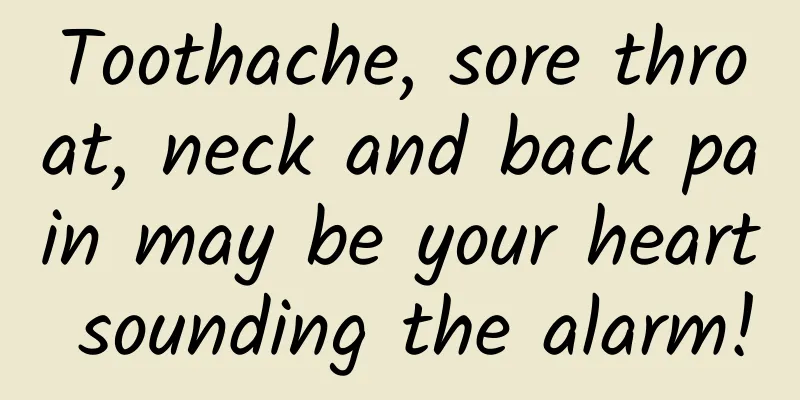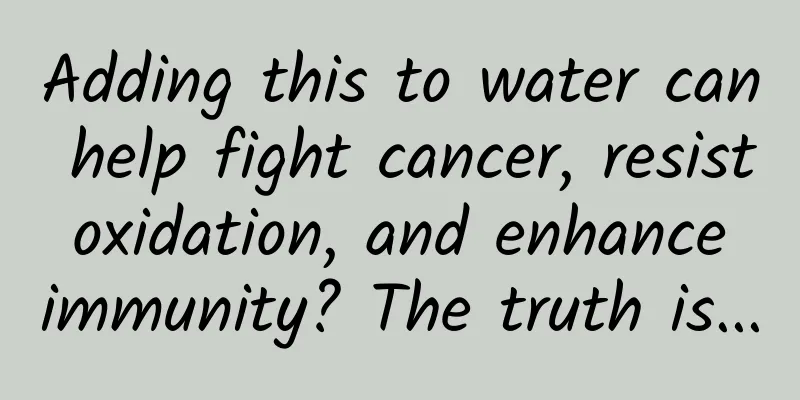Toothache, sore throat, neck and back pain may be your heart sounding the alarm!

|
Staying up late, working overtime, and being under great pressure are topics that cannot be avoided. Recently, 38-year-old Xiao Yan encountered the year-end performance assessment stage. After working overtime for several days, he felt pain in his left shoulder. At first, he didn't take it seriously, thinking it was a shoulder and neck problem caused by sitting for a long time. However, not long after, the symptoms of toothache appeared again, accompanied by chest tightness, chest pain, and general fatigue. Xiao Yan quickly called 120 and went to the hospital emergency room. After an examination, it was terrible that he had a heart attack at such a young age, and the situation was extremely dangerous! Image source: Photo Network 01 What is a heart attack? Image source: Photo Network Myocardial infarction refers to an acute blockage of the coronary arteries, insufficient blood supply to the myocardium, resulting in myocardial ischemia and necrosis, which can be a life-threatening emergency. Among them, coronary atherosclerosis is the most common cause of myocardial infarction. Previous heart disease, smoking, diabetes, dyslipidemia, overweight or obesity, unreasonable diet, long-term sitting, lack of exercise, stress, emotional excitement, weather changes, etc. are all causes of acute myocardial infarction. Image source: Photo Network In response to Xiao Yan's condition, the hospital immediately arranged for an emergency coronary angiography. The results showed that the 38-year-old body had the blood vessels of an 80-year-old! Coronary angiography confirmed that Xiao Yan had two major coronary arteries with severe stenosis, one of which was almost completely occluded and had thrombosis. It was this blockage of the blood vessel that prevented blood oxygen from being supplied to the heart in time, causing large areas of myocardial ischemia and necrosis. If he had not been sent to the hospital in time, he would have been at risk of sudden death at any time. The doctor placed a stent in Xiao Yan's blood vessels and brought him back from the brink of death. 02 Why do young people also suffer from heart attacks? Xiao Yan was very puzzled: he doesn't smoke, doesn't drink, and isn't very old, so how could he have a heart attack? Isn't myocardial infarction considered an old age disease? Studies have shown that myocardial infarction is no longer a disease that only affects the elderly, and more and more young people are being quietly targeted by it. In recent years, the incidence of acute myocardial infarction in people under 45 has been increasing year by year. Staying up late to work, stay up late to watch TV series, stay up late to play games, stay up late to browse the phone... However, even the youngest body can't stand the constant tossing of 997 or 857. Therefore, staying up late may not necessarily lead to financial freedom, but may lead to ending up in the ICU. Image source: Photo Network An unhealthy lifestyle is often accompanied by unhealthy diet, overweight or obesity, long periods of sitting, etc. Xiao Yan admitted that when he was busy with work, he would just eat a few bites at a time. The more tired he was, the more he wanted to eat something "heavy". Milk tea, desserts, and supper were common. The gym membership card he bought a year ago was already gathering dust in the drawer. He had no time to go there when he was busy. When he didn't work overtime, he just wanted to go home and lie down like Ge You. The heart has been "ravaged" by an unhealthy lifestyle for a long time and has become vulnerable. Mental stress and overwork are often the last straw that breaks the camel's back. Smoking, unhealthy diet, irregular work and rest, staying up late for a long time, mental stress, overwork, sitting for a long time without exercise, being overweight or obese... young people take advantage of their young age and do not pay attention to their lifestyle, which may greatly increase the risk of myocardial infarction. Image source: Photo Network Therefore, the occurrence of myocardial infarction does not happen overnight, but has long been "foreshadowed" in every aspect of life. Young people often have an acute onset of myocardial infarction, and usually do not have pre-adaptation of myocardial ischemia such as angina pectoris. Compared with the elderly, young people have a greater myocardial oxygen demand. Once an acute myocardial infarction occurs, the imbalance between myocardial oxygen supply and demand is significantly aggravated, often leading to large-scale or severe myocardial infarction, and increasing the chance of sudden death. Unfortunately, myocardial necrosis is irreversible! Xiao Yan's coronary artery aging rate is extremely inconsistent with that of a young person. The health of his blood vessels is the same as that of an 80-year-old man. His heart has suffered an irreversible blow, and the risk of heart failure, arrhythmia, and sudden death in the future is also very high. What factors increase the risk of myocardial infarction? · Heredity: If there is a family history of myocardial infarction in the direct relatives, such as parents, siblings or those with a history of myocardial infarction, especially a family history of premature coronary heart disease (male <55 years old, female <65 years old), the risk of myocardial infarction will increase. Age: Men aged 45 and older and women aged 55 and older are more likely to have a heart attack than younger men and women. · Smoking: This includes smoking cigarettes and long-term exposure to secondhand smoke. Hyperlipidemia: High levels of low-density lipoprotein cholesterol (“bad” cholesterol) are most likely to narrow your arteries; high levels of triglycerides also increase your risk of heart attack. · Diabetes: Diabetes not only damages the heart and blood vessels, but also makes the heart become "stunned" and insensitive to pain, thus delaying the detection of the disease. · High blood pressure: High blood pressure can damage your arteries, especially if it's not controlled. · Obesity: The longer the waistline, the shorter the life span. Lack of exercise: Lack of exercise can lead to increased blood lipid levels and obesity. People who exercise regularly are more likely to have higher blood lipid levels than those who lack exercise. The temperature difference between day and night is large, and many infectious diseases are prevalent. We should pay more attention, strengthen physical exercise, develop good habits, and greet the end of the year with a healthy body. 03 Heart attack is not silent - be alert if you have these symptoms Some patients may experience symptoms such as chest discomfort, precordial pain, palpitations, shortness of breath, and fatigue a few days to months before the onset of the disease. 1) Typical symptoms The onset of the disease is usually characterized by chest pain, which is concentrated behind the sternum and in front of the heart, and is the size of the palm of the hand. It lasts for more than 20 to 30 minutes without relief. The degree is severe, oppressive, and unbearable, accompanied by a sense of impending death. It often radiates to the left shoulder, the inner side of the left arm, the ring finger and the little finger, or to the neck, pharynx, or mandible. Rest and sublingual nitroglycerin generally cannot relieve the pain. 2) Atypical symptoms A small number of patients may not have obvious chest pain, or even experience pain in the area between the mouth and navel, such as sore throat, toothache, neck pain, left shoulder pain, etc., accompanied by chest tightness, shortness of breath, dyspnea, upper abdominal pain, nausea, and vomiting. In severe cases, symptoms may directly include cold limbs, sweating all over the body, confusion, syncope, and sudden death. Not all myocardial infarction patients have similar symptoms. Some have milder symptoms, while others have more severe symptoms. The more and more obvious the symptoms are, the greater the possibility of myocardial infarction. Image source: provided by the author How to determine whether there is a potential risk of acute myocardial infarction? Take an electrocardiogram in time and nearby! Combined with blood tests, you can preliminarily determine whether there is a myocardial infarction. 04 How to save yourself when a heart attack occurs? Remember two 120s When a heart attack occurs, it is crucial to seek medical treatment promptly. If not treated in time, it will be life-threatening. When a heart attack occurs, remember the 120 rule: Dial 120 emergency number immediately; the golden time for treating myocardial infarction is 120 minutes. Wait for the ambulance to arrive and take any medications recommended by medical staff. While waiting for 120, rest on the spot, avoid getting emotional, and do not drive to the hospital by yourself. This is not recommended: ✘ Underestimating the condition: Being young is no longer a safe bet for myocardial infarction. As long as the symptoms highly suspect the possibility of myocardial infarction, do not take chances and seek medical attention in time. ✘ Taking nitroglycerin at will: The blood pressure of some patients with myocardial infarction is lowered during the onset of the disease. Nitroglycerin has a blood pressure lowering effect. Taking nitroglycerin at this time will make the condition worse. ✘ Driving to the hospital by yourself: If the condition suddenly worsens, it will delay medical treatment and even cause a traffic accident, resulting in secondary injury. ✘ Don’t go to a designated hospital: The golden time for treating a heart attack is very short, so you should seek medical treatment nearby. 05 Why is autumn and winter the peak season for myocardial infarction? In autumn and winter, the human body is stimulated by cold, the excitability of the sympathetic nervous system increases, the secretion of catecholamines in the body increases, causing vasoconstriction, faster heart rate, greater cardiac workload, and increased oxygen consumption. At this time, the myocardium suffers from ischemia and hypoxia, and the probability of angina pectoris increases significantly. Image source: Photo Network Coldness can also induce the rupture of plaques in blood vessels, making platelets easier to aggregate, increasing blood viscosity, concentrating the blood and forming blood clots, which is also an important cause of myocardial infarction. Sympathetic nerve excitement and catecholamines can also cause coronary artery spasm, so we should pay great attention to it in autumn and winter! 06 How to avoid heart attack? The most important thing is to change your lifestyle: quit smoking, limit alcohol consumption; eat more fruits, vegetables and fish; eat less meat and eat a light diet; control your weight, exercise regularly and avoid sitting for long periods of time. In autumn and winter, control your blood pressure and keep warm. In addition, physical examinations are very important. They can detect whether you are overweight, obese, have high blood pressure, diabetes, hyperlipidemia, etc. at an early stage. If the above conditions are found, intervention and treatment must be carried out as soon as possible. Do not take it lightly just because you think you are young. Image source: Photo Network Author: Chen Jiahui, Doctor of Medicine, Fudan University, Cardiologist, Zhongshan Hospital, Fudan University Editor: Tiara |
<<: Shh...listen to what little secrets the plants are whispering?
>>: Data from over 700,000 people: These 8 simple habits can significantly extend your lifespan
Recommend
Pay attention! At critical moments, this glass panel on the ceiling of the mall can save lives →
When everyone is shopping in the mall Did you fin...
Regarding the bidding data analysis of Shangwutong, how to analyze the bidding data?
The statistics of Shangwutong should be analyzed ...
Zuoyebang product operation strategy!
Zuoyebang is committed to providing learning tuto...
China, a karst country
Karst landforms are widely distributed in the wor...
Learn how to place Zhihu information flow ads in one article!
Today I decided to use this article to talk about...
Long-term irregular life can lead to heart failure! These methods can help you protect your cardiovascular system
One meal hungry, one meal full; one night sleep, ...
Is Microsoft taking a risky move to use Android to save Windows?
Earlier, there was news that the consumer preview...
If a nuclear bomb were dropped on the Yellowstone volcano, would it cause a huge disaster?
Yellowstone is a supervolcano located in Yellowst...
How to reduce APP uninstall rate? Here are seven ways!
The mobile application market is now a crowded ma...
Xiaohongshu keyword ranking strategy!
|Directory| 1. Xiaohongshu search ranking 2. The ...
Review of the 2017 Double 11 event operation routines, have you been fooled?
In 2017, the transaction volume on Double 11 reac...
Raising Alsophila spinulosa as a potted plant? Beware of life in prison
If you walk into the greenhouse of Wuhan Botanica...
Detailed explanation on how to quickly reconstruct the operation strategy of private domain e-commerce
Tencent’s official definition of private domain i...
How to avoid invalid traffic and improve traffic quality in bidding promotion?
Today’s sharing content is about the details of d...
WhatsApp closed beta test of multi-device information transmission: seamless synchronization, can be used without connecting to a mobile phone
According to reports, Facebook has recently annou...









